Leadership and Management for Service Industries: HNC Report
VerifiedAdded on 2021/02/20
|8
|2062
|33
Report
AI Summary
This report delves into the concepts of leadership and management within organizations, emphasizing their crucial role in driving growth, operational quality, and resource utilization. Using Wa-Pila Hotels, a UK-based hospitality business, as a case study, the report provides a comprehensive overview of classical management theories, leadership roles in the service sector, and the influence of internal and external factors on management styles. It explores both hard and soft skills essential for effective management, including communication, leadership, and decision-making. The report also forecasts future leadership and management skills needed in the service industry, such as teamwork and critical thinking, and compares change management systems and leadership styles across different service industry organizations, highlighting the contrasting approaches of Wa-Pila Hotels and Emirates. The conclusion underscores the importance of adopting effective managerial approaches and fostering a healthy working environment to adapt to changes and achieve a competitive edge.
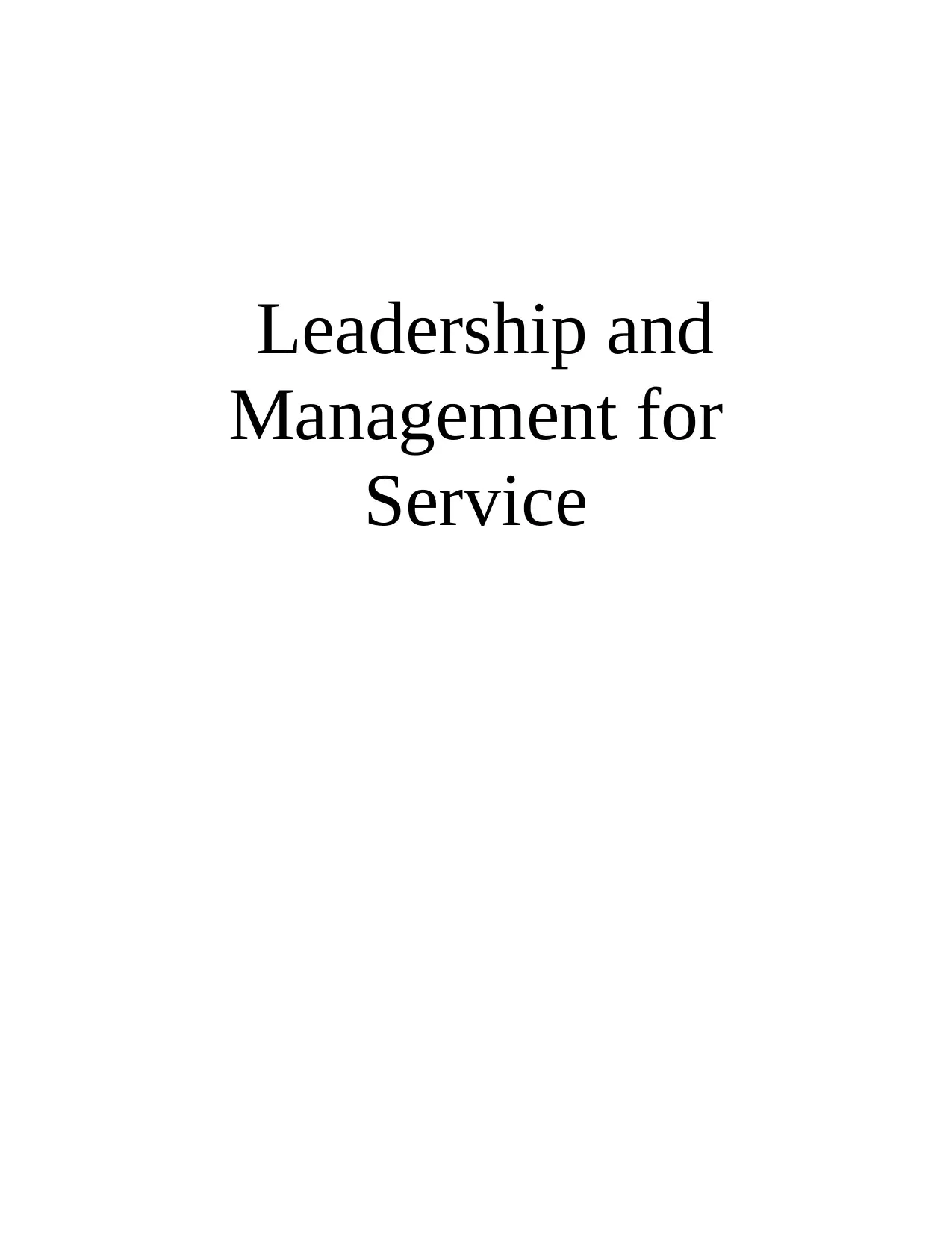
Leadership and
Management for
Service
Management for
Service
Paraphrase This Document
Need a fresh take? Get an instant paraphrase of this document with our AI Paraphraser
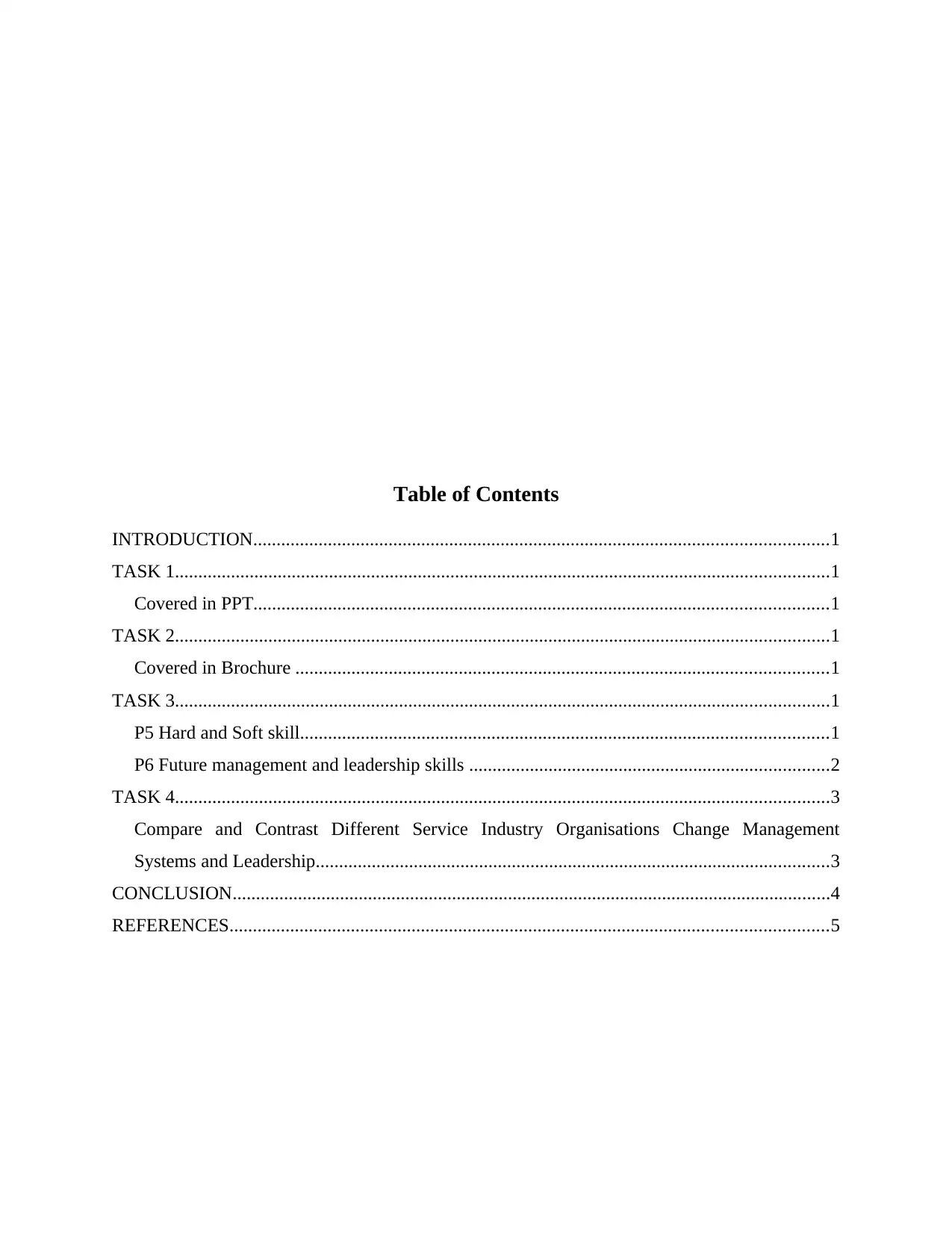
Table of Contents
INTRODUCTION...........................................................................................................................1
TASK 1............................................................................................................................................1
Covered in PPT...........................................................................................................................1
TASK 2............................................................................................................................................1
Covered in Brochure ..................................................................................................................1
TASK 3............................................................................................................................................1
P5 Hard and Soft skill.................................................................................................................1
P6 Future management and leadership skills .............................................................................2
TASK 4............................................................................................................................................3
Compare and Contrast Different Service Industry Organisations Change Management
Systems and Leadership..............................................................................................................3
CONCLUSION................................................................................................................................4
REFERENCES................................................................................................................................5
INTRODUCTION...........................................................................................................................1
TASK 1............................................................................................................................................1
Covered in PPT...........................................................................................................................1
TASK 2............................................................................................................................................1
Covered in Brochure ..................................................................................................................1
TASK 3............................................................................................................................................1
P5 Hard and Soft skill.................................................................................................................1
P6 Future management and leadership skills .............................................................................2
TASK 4............................................................................................................................................3
Compare and Contrast Different Service Industry Organisations Change Management
Systems and Leadership..............................................................................................................3
CONCLUSION................................................................................................................................4
REFERENCES................................................................................................................................5

⊘ This is a preview!⊘
Do you want full access?
Subscribe today to unlock all pages.

Trusted by 1+ million students worldwide
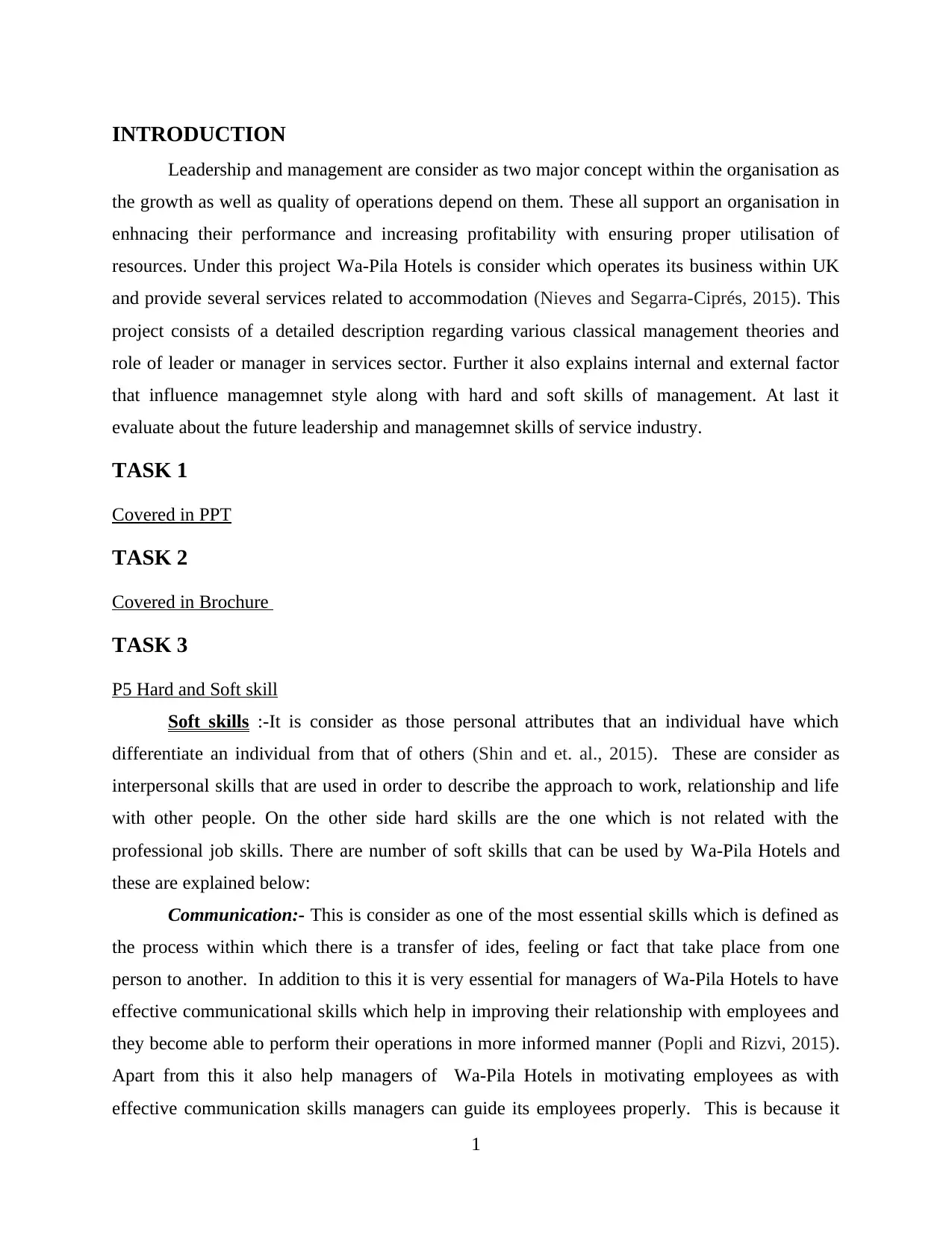
INTRODUCTION
Leadership and management are consider as two major concept within the organisation as
the growth as well as quality of operations depend on them. These all support an organisation in
enhnacing their performance and increasing profitability with ensuring proper utilisation of
resources. Under this project Wa-Pila Hotels is consider which operates its business within UK
and provide several services related to accommodation (Nieves and Segarra-Ciprés, 2015). This
project consists of a detailed description regarding various classical management theories and
role of leader or manager in services sector. Further it also explains internal and external factor
that influence managemnet style along with hard and soft skills of management. At last it
evaluate about the future leadership and managemnet skills of service industry.
TASK 1
Covered in PPT
TASK 2
Covered in Brochure
TASK 3
P5 Hard and Soft skill
Soft skills :-It is consider as those personal attributes that an individual have which
differentiate an individual from that of others (Shin and et. al., 2015). These are consider as
interpersonal skills that are used in order to describe the approach to work, relationship and life
with other people. On the other side hard skills are the one which is not related with the
professional job skills. There are number of soft skills that can be used by Wa-Pila Hotels and
these are explained below:
Communication:- This is consider as one of the most essential skills which is defined as
the process within which there is a transfer of ides, feeling or fact that take place from one
person to another. In addition to this it is very essential for managers of Wa-Pila Hotels to have
effective communicational skills which help in improving their relationship with employees and
they become able to perform their operations in more informed manner (Popli and Rizvi, 2015).
Apart from this it also help managers of Wa-Pila Hotels in motivating employees as with
effective communication skills managers can guide its employees properly. This is because it
1
Leadership and management are consider as two major concept within the organisation as
the growth as well as quality of operations depend on them. These all support an organisation in
enhnacing their performance and increasing profitability with ensuring proper utilisation of
resources. Under this project Wa-Pila Hotels is consider which operates its business within UK
and provide several services related to accommodation (Nieves and Segarra-Ciprés, 2015). This
project consists of a detailed description regarding various classical management theories and
role of leader or manager in services sector. Further it also explains internal and external factor
that influence managemnet style along with hard and soft skills of management. At last it
evaluate about the future leadership and managemnet skills of service industry.
TASK 1
Covered in PPT
TASK 2
Covered in Brochure
TASK 3
P5 Hard and Soft skill
Soft skills :-It is consider as those personal attributes that an individual have which
differentiate an individual from that of others (Shin and et. al., 2015). These are consider as
interpersonal skills that are used in order to describe the approach to work, relationship and life
with other people. On the other side hard skills are the one which is not related with the
professional job skills. There are number of soft skills that can be used by Wa-Pila Hotels and
these are explained below:
Communication:- This is consider as one of the most essential skills which is defined as
the process within which there is a transfer of ides, feeling or fact that take place from one
person to another. In addition to this it is very essential for managers of Wa-Pila Hotels to have
effective communicational skills which help in improving their relationship with employees and
they become able to perform their operations in more informed manner (Popli and Rizvi, 2015).
Apart from this it also help managers of Wa-Pila Hotels in motivating employees as with
effective communication skills managers can guide its employees properly. This is because it
1
Paraphrase This Document
Need a fresh take? Get an instant paraphrase of this document with our AI Paraphraser
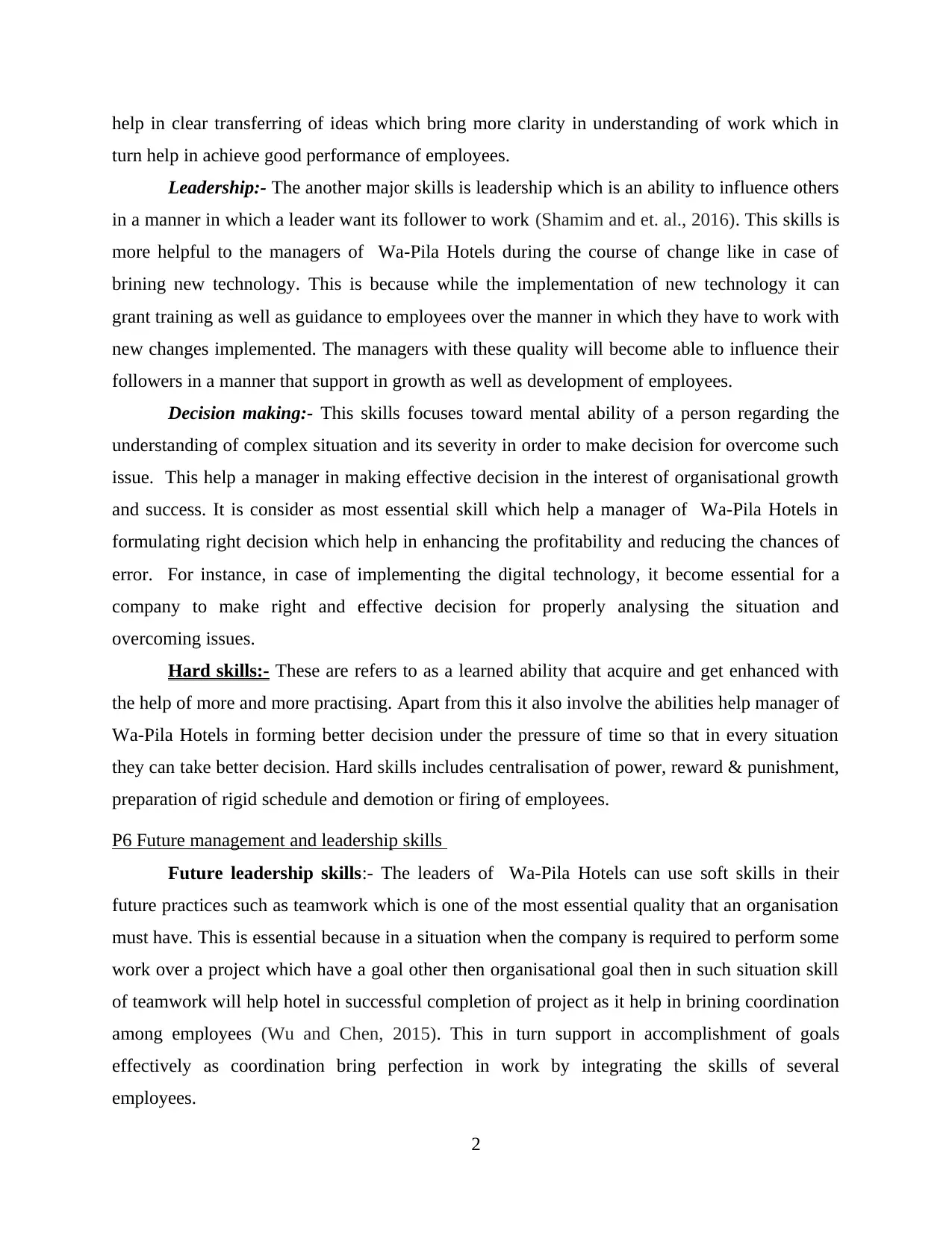
help in clear transferring of ideas which bring more clarity in understanding of work which in
turn help in achieve good performance of employees.
Leadership:- The another major skills is leadership which is an ability to influence others
in a manner in which a leader want its follower to work (Shamim and et. al., 2016). This skills is
more helpful to the managers of Wa-Pila Hotels during the course of change like in case of
brining new technology. This is because while the implementation of new technology it can
grant training as well as guidance to employees over the manner in which they have to work with
new changes implemented. The managers with these quality will become able to influence their
followers in a manner that support in growth as well as development of employees.
Decision making:- This skills focuses toward mental ability of a person regarding the
understanding of complex situation and its severity in order to make decision for overcome such
issue. This help a manager in making effective decision in the interest of organisational growth
and success. It is consider as most essential skill which help a manager of Wa-Pila Hotels in
formulating right decision which help in enhancing the profitability and reducing the chances of
error. For instance, in case of implementing the digital technology, it become essential for a
company to make right and effective decision for properly analysing the situation and
overcoming issues.
Hard skills:- These are refers to as a learned ability that acquire and get enhanced with
the help of more and more practising. Apart from this it also involve the abilities help manager of
Wa-Pila Hotels in forming better decision under the pressure of time so that in every situation
they can take better decision. Hard skills includes centralisation of power, reward & punishment,
preparation of rigid schedule and demotion or firing of employees.
P6 Future management and leadership skills
Future leadership skills:- The leaders of Wa-Pila Hotels can use soft skills in their
future practices such as teamwork which is one of the most essential quality that an organisation
must have. This is essential because in a situation when the company is required to perform some
work over a project which have a goal other then organisational goal then in such situation skill
of teamwork will help hotel in successful completion of project as it help in brining coordination
among employees (Wu and Chen, 2015). This in turn support in accomplishment of goals
effectively as coordination bring perfection in work by integrating the skills of several
employees.
2
turn help in achieve good performance of employees.
Leadership:- The another major skills is leadership which is an ability to influence others
in a manner in which a leader want its follower to work (Shamim and et. al., 2016). This skills is
more helpful to the managers of Wa-Pila Hotels during the course of change like in case of
brining new technology. This is because while the implementation of new technology it can
grant training as well as guidance to employees over the manner in which they have to work with
new changes implemented. The managers with these quality will become able to influence their
followers in a manner that support in growth as well as development of employees.
Decision making:- This skills focuses toward mental ability of a person regarding the
understanding of complex situation and its severity in order to make decision for overcome such
issue. This help a manager in making effective decision in the interest of organisational growth
and success. It is consider as most essential skill which help a manager of Wa-Pila Hotels in
formulating right decision which help in enhancing the profitability and reducing the chances of
error. For instance, in case of implementing the digital technology, it become essential for a
company to make right and effective decision for properly analysing the situation and
overcoming issues.
Hard skills:- These are refers to as a learned ability that acquire and get enhanced with
the help of more and more practising. Apart from this it also involve the abilities help manager of
Wa-Pila Hotels in forming better decision under the pressure of time so that in every situation
they can take better decision. Hard skills includes centralisation of power, reward & punishment,
preparation of rigid schedule and demotion or firing of employees.
P6 Future management and leadership skills
Future leadership skills:- The leaders of Wa-Pila Hotels can use soft skills in their
future practices such as teamwork which is one of the most essential quality that an organisation
must have. This is essential because in a situation when the company is required to perform some
work over a project which have a goal other then organisational goal then in such situation skill
of teamwork will help hotel in successful completion of project as it help in brining coordination
among employees (Wu and Chen, 2015). This in turn support in accomplishment of goals
effectively as coordination bring perfection in work by integrating the skills of several
employees.
2
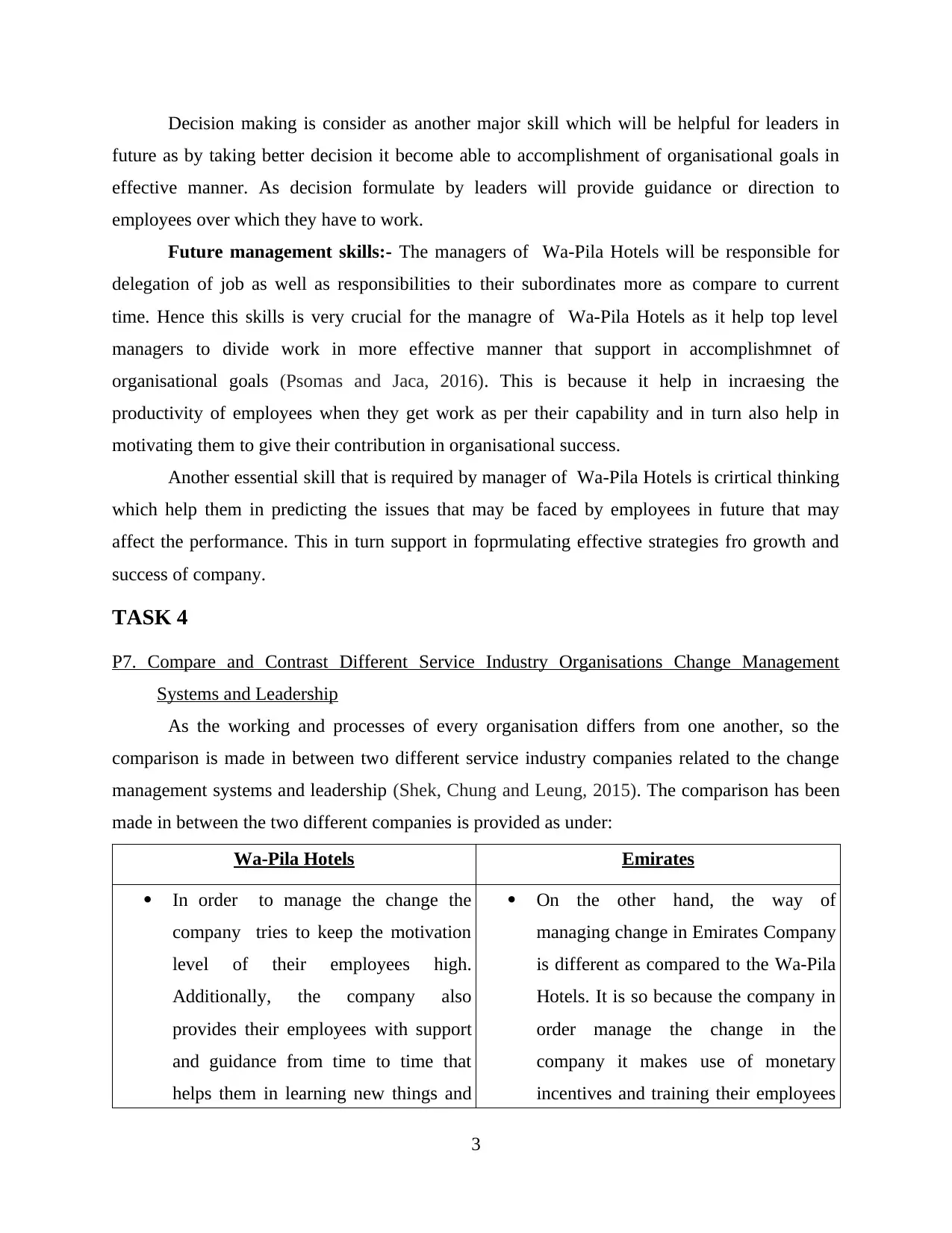
Decision making is consider as another major skill which will be helpful for leaders in
future as by taking better decision it become able to accomplishment of organisational goals in
effective manner. As decision formulate by leaders will provide guidance or direction to
employees over which they have to work.
Future management skills:- The managers of Wa-Pila Hotels will be responsible for
delegation of job as well as responsibilities to their subordinates more as compare to current
time. Hence this skills is very crucial for the managre of Wa-Pila Hotels as it help top level
managers to divide work in more effective manner that support in accomplishmnet of
organisational goals (Psomas and Jaca, 2016). This is because it help in incraesing the
productivity of employees when they get work as per their capability and in turn also help in
motivating them to give their contribution in organisational success.
Another essential skill that is required by manager of Wa-Pila Hotels is crirtical thinking
which help them in predicting the issues that may be faced by employees in future that may
affect the performance. This in turn support in foprmulating effective strategies fro growth and
success of company.
TASK 4
P7. Compare and Contrast Different Service Industry Organisations Change Management
Systems and Leadership
As the working and processes of every organisation differs from one another, so the
comparison is made in between two different service industry companies related to the change
management systems and leadership (Shek, Chung and Leung, 2015). The comparison has been
made in between the two different companies is provided as under:
Wa-Pila Hotels Emirates
In order to manage the change the
company tries to keep the motivation
level of their employees high.
Additionally, the company also
provides their employees with support
and guidance from time to time that
helps them in learning new things and
On the other hand, the way of
managing change in Emirates Company
is different as compared to the Wa-Pila
Hotels. It is so because the company in
order manage the change in the
company it makes use of monetary
incentives and training their employees
3
future as by taking better decision it become able to accomplishment of organisational goals in
effective manner. As decision formulate by leaders will provide guidance or direction to
employees over which they have to work.
Future management skills:- The managers of Wa-Pila Hotels will be responsible for
delegation of job as well as responsibilities to their subordinates more as compare to current
time. Hence this skills is very crucial for the managre of Wa-Pila Hotels as it help top level
managers to divide work in more effective manner that support in accomplishmnet of
organisational goals (Psomas and Jaca, 2016). This is because it help in incraesing the
productivity of employees when they get work as per their capability and in turn also help in
motivating them to give their contribution in organisational success.
Another essential skill that is required by manager of Wa-Pila Hotels is crirtical thinking
which help them in predicting the issues that may be faced by employees in future that may
affect the performance. This in turn support in foprmulating effective strategies fro growth and
success of company.
TASK 4
P7. Compare and Contrast Different Service Industry Organisations Change Management
Systems and Leadership
As the working and processes of every organisation differs from one another, so the
comparison is made in between two different service industry companies related to the change
management systems and leadership (Shek, Chung and Leung, 2015). The comparison has been
made in between the two different companies is provided as under:
Wa-Pila Hotels Emirates
In order to manage the change the
company tries to keep the motivation
level of their employees high.
Additionally, the company also
provides their employees with support
and guidance from time to time that
helps them in learning new things and
On the other hand, the way of
managing change in Emirates Company
is different as compared to the Wa-Pila
Hotels. It is so because the company in
order manage the change in the
company it makes use of monetary
incentives and training their employees
3
⊘ This is a preview!⊘
Do you want full access?
Subscribe today to unlock all pages.

Trusted by 1+ million students worldwide
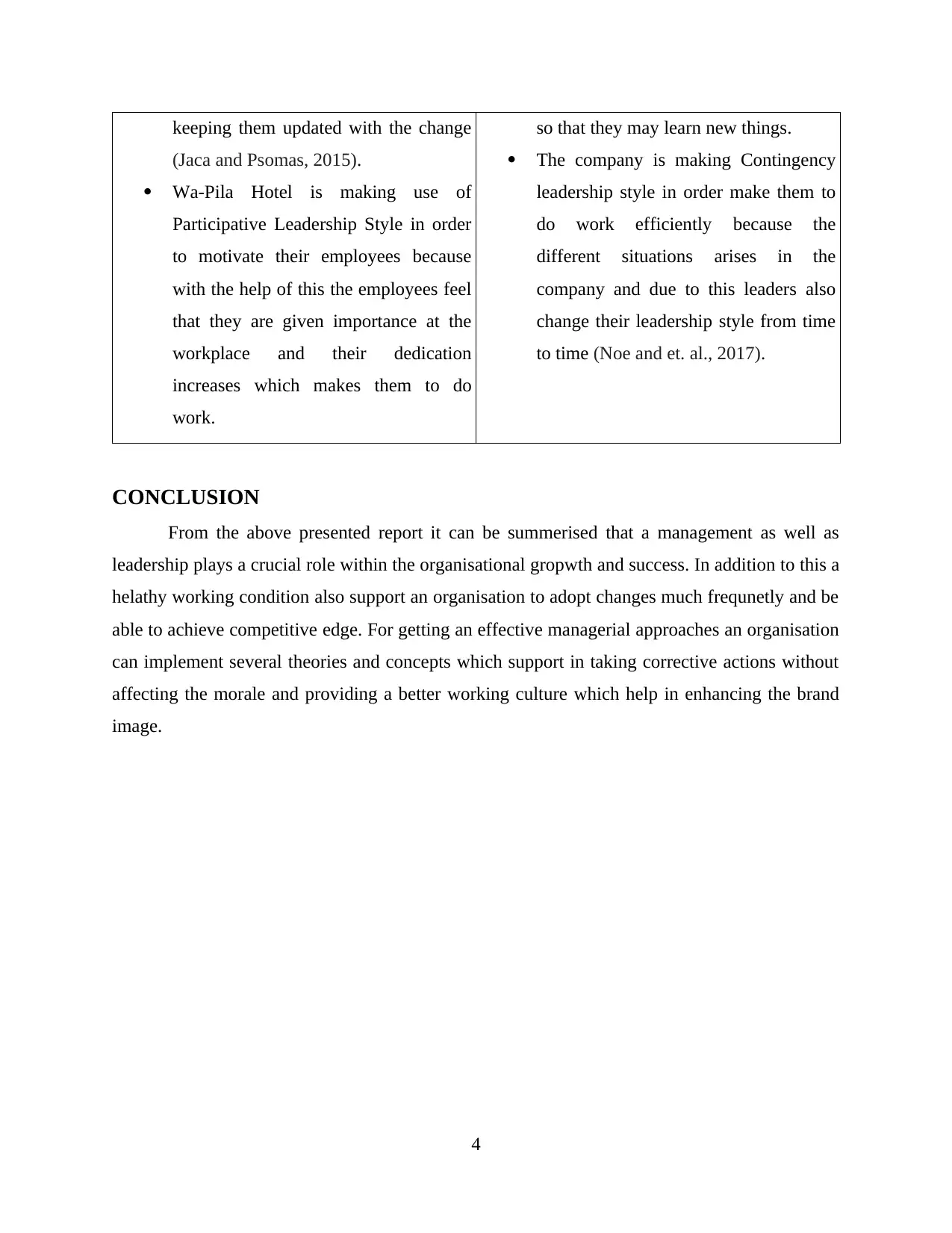
keeping them updated with the change
(Jaca and Psomas, 2015).
Wa-Pila Hotel is making use of
Participative Leadership Style in order
to motivate their employees because
with the help of this the employees feel
that they are given importance at the
workplace and their dedication
increases which makes them to do
work.
so that they may learn new things.
The company is making Contingency
leadership style in order make them to
do work efficiently because the
different situations arises in the
company and due to this leaders also
change their leadership style from time
to time (Noe and et. al., 2017).
CONCLUSION
From the above presented report it can be summerised that a management as well as
leadership plays a crucial role within the organisational gropwth and success. In addition to this a
helathy working condition also support an organisation to adopt changes much frequnetly and be
able to achieve competitive edge. For getting an effective managerial approaches an organisation
can implement several theories and concepts which support in taking corrective actions without
affecting the morale and providing a better working culture which help in enhancing the brand
image.
4
(Jaca and Psomas, 2015).
Wa-Pila Hotel is making use of
Participative Leadership Style in order
to motivate their employees because
with the help of this the employees feel
that they are given importance at the
workplace and their dedication
increases which makes them to do
work.
so that they may learn new things.
The company is making Contingency
leadership style in order make them to
do work efficiently because the
different situations arises in the
company and due to this leaders also
change their leadership style from time
to time (Noe and et. al., 2017).
CONCLUSION
From the above presented report it can be summerised that a management as well as
leadership plays a crucial role within the organisational gropwth and success. In addition to this a
helathy working condition also support an organisation to adopt changes much frequnetly and be
able to achieve competitive edge. For getting an effective managerial approaches an organisation
can implement several theories and concepts which support in taking corrective actions without
affecting the morale and providing a better working culture which help in enhancing the brand
image.
4
Paraphrase This Document
Need a fresh take? Get an instant paraphrase of this document with our AI Paraphraser
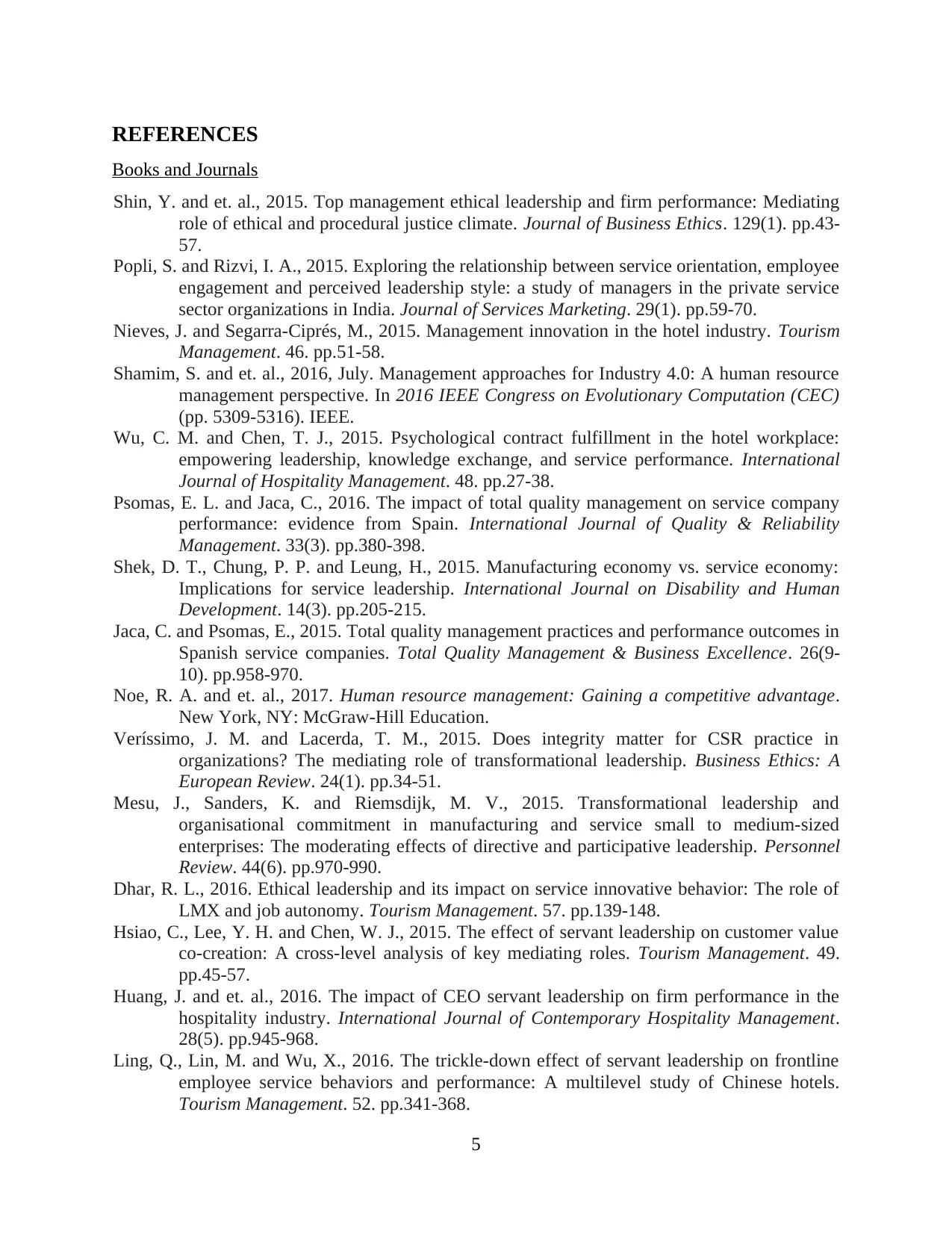
REFERENCES
Books and Journals
Shin, Y. and et. al., 2015. Top management ethical leadership and firm performance: Mediating
role of ethical and procedural justice climate. Journal of Business Ethics. 129(1). pp.43-
57.
Popli, S. and Rizvi, I. A., 2015. Exploring the relationship between service orientation, employee
engagement and perceived leadership style: a study of managers in the private service
sector organizations in India. Journal of Services Marketing. 29(1). pp.59-70.
Nieves, J. and Segarra-Ciprés, M., 2015. Management innovation in the hotel industry. Tourism
Management. 46. pp.51-58.
Shamim, S. and et. al., 2016, July. Management approaches for Industry 4.0: A human resource
management perspective. In 2016 IEEE Congress on Evolutionary Computation (CEC)
(pp. 5309-5316). IEEE.
Wu, C. M. and Chen, T. J., 2015. Psychological contract fulfillment in the hotel workplace:
empowering leadership, knowledge exchange, and service performance. International
Journal of Hospitality Management. 48. pp.27-38.
Psomas, E. L. and Jaca, C., 2016. The impact of total quality management on service company
performance: evidence from Spain. International Journal of Quality & Reliability
Management. 33(3). pp.380-398.
Shek, D. T., Chung, P. P. and Leung, H., 2015. Manufacturing economy vs. service economy:
Implications for service leadership. International Journal on Disability and Human
Development. 14(3). pp.205-215.
Jaca, C. and Psomas, E., 2015. Total quality management practices and performance outcomes in
Spanish service companies. Total Quality Management & Business Excellence. 26(9-
10). pp.958-970.
Noe, R. A. and et. al., 2017. Human resource management: Gaining a competitive advantage.
New York, NY: McGraw-Hill Education.
Veríssimo, J. M. and Lacerda, T. M., 2015. Does integrity matter for CSR practice in
organizations? The mediating role of transformational leadership. Business Ethics: A
European Review. 24(1). pp.34-51.
Mesu, J., Sanders, K. and Riemsdijk, M. V., 2015. Transformational leadership and
organisational commitment in manufacturing and service small to medium-sized
enterprises: The moderating effects of directive and participative leadership. Personnel
Review. 44(6). pp.970-990.
Dhar, R. L., 2016. Ethical leadership and its impact on service innovative behavior: The role of
LMX and job autonomy. Tourism Management. 57. pp.139-148.
Hsiao, C., Lee, Y. H. and Chen, W. J., 2015. The effect of servant leadership on customer value
co-creation: A cross-level analysis of key mediating roles. Tourism Management. 49.
pp.45-57.
Huang, J. and et. al., 2016. The impact of CEO servant leadership on firm performance in the
hospitality industry. International Journal of Contemporary Hospitality Management.
28(5). pp.945-968.
Ling, Q., Lin, M. and Wu, X., 2016. The trickle-down effect of servant leadership on frontline
employee service behaviors and performance: A multilevel study of Chinese hotels.
Tourism Management. 52. pp.341-368.
5
Books and Journals
Shin, Y. and et. al., 2015. Top management ethical leadership and firm performance: Mediating
role of ethical and procedural justice climate. Journal of Business Ethics. 129(1). pp.43-
57.
Popli, S. and Rizvi, I. A., 2015. Exploring the relationship between service orientation, employee
engagement and perceived leadership style: a study of managers in the private service
sector organizations in India. Journal of Services Marketing. 29(1). pp.59-70.
Nieves, J. and Segarra-Ciprés, M., 2015. Management innovation in the hotel industry. Tourism
Management. 46. pp.51-58.
Shamim, S. and et. al., 2016, July. Management approaches for Industry 4.0: A human resource
management perspective. In 2016 IEEE Congress on Evolutionary Computation (CEC)
(pp. 5309-5316). IEEE.
Wu, C. M. and Chen, T. J., 2015. Psychological contract fulfillment in the hotel workplace:
empowering leadership, knowledge exchange, and service performance. International
Journal of Hospitality Management. 48. pp.27-38.
Psomas, E. L. and Jaca, C., 2016. The impact of total quality management on service company
performance: evidence from Spain. International Journal of Quality & Reliability
Management. 33(3). pp.380-398.
Shek, D. T., Chung, P. P. and Leung, H., 2015. Manufacturing economy vs. service economy:
Implications for service leadership. International Journal on Disability and Human
Development. 14(3). pp.205-215.
Jaca, C. and Psomas, E., 2015. Total quality management practices and performance outcomes in
Spanish service companies. Total Quality Management & Business Excellence. 26(9-
10). pp.958-970.
Noe, R. A. and et. al., 2017. Human resource management: Gaining a competitive advantage.
New York, NY: McGraw-Hill Education.
Veríssimo, J. M. and Lacerda, T. M., 2015. Does integrity matter for CSR practice in
organizations? The mediating role of transformational leadership. Business Ethics: A
European Review. 24(1). pp.34-51.
Mesu, J., Sanders, K. and Riemsdijk, M. V., 2015. Transformational leadership and
organisational commitment in manufacturing and service small to medium-sized
enterprises: The moderating effects of directive and participative leadership. Personnel
Review. 44(6). pp.970-990.
Dhar, R. L., 2016. Ethical leadership and its impact on service innovative behavior: The role of
LMX and job autonomy. Tourism Management. 57. pp.139-148.
Hsiao, C., Lee, Y. H. and Chen, W. J., 2015. The effect of servant leadership on customer value
co-creation: A cross-level analysis of key mediating roles. Tourism Management. 49.
pp.45-57.
Huang, J. and et. al., 2016. The impact of CEO servant leadership on firm performance in the
hospitality industry. International Journal of Contemporary Hospitality Management.
28(5). pp.945-968.
Ling, Q., Lin, M. and Wu, X., 2016. The trickle-down effect of servant leadership on frontline
employee service behaviors and performance: A multilevel study of Chinese hotels.
Tourism Management. 52. pp.341-368.
5
1 out of 8
Related Documents
Your All-in-One AI-Powered Toolkit for Academic Success.
+13062052269
info@desklib.com
Available 24*7 on WhatsApp / Email
![[object Object]](/_next/static/media/star-bottom.7253800d.svg)
Unlock your academic potential
Copyright © 2020–2026 A2Z Services. All Rights Reserved. Developed and managed by ZUCOL.





